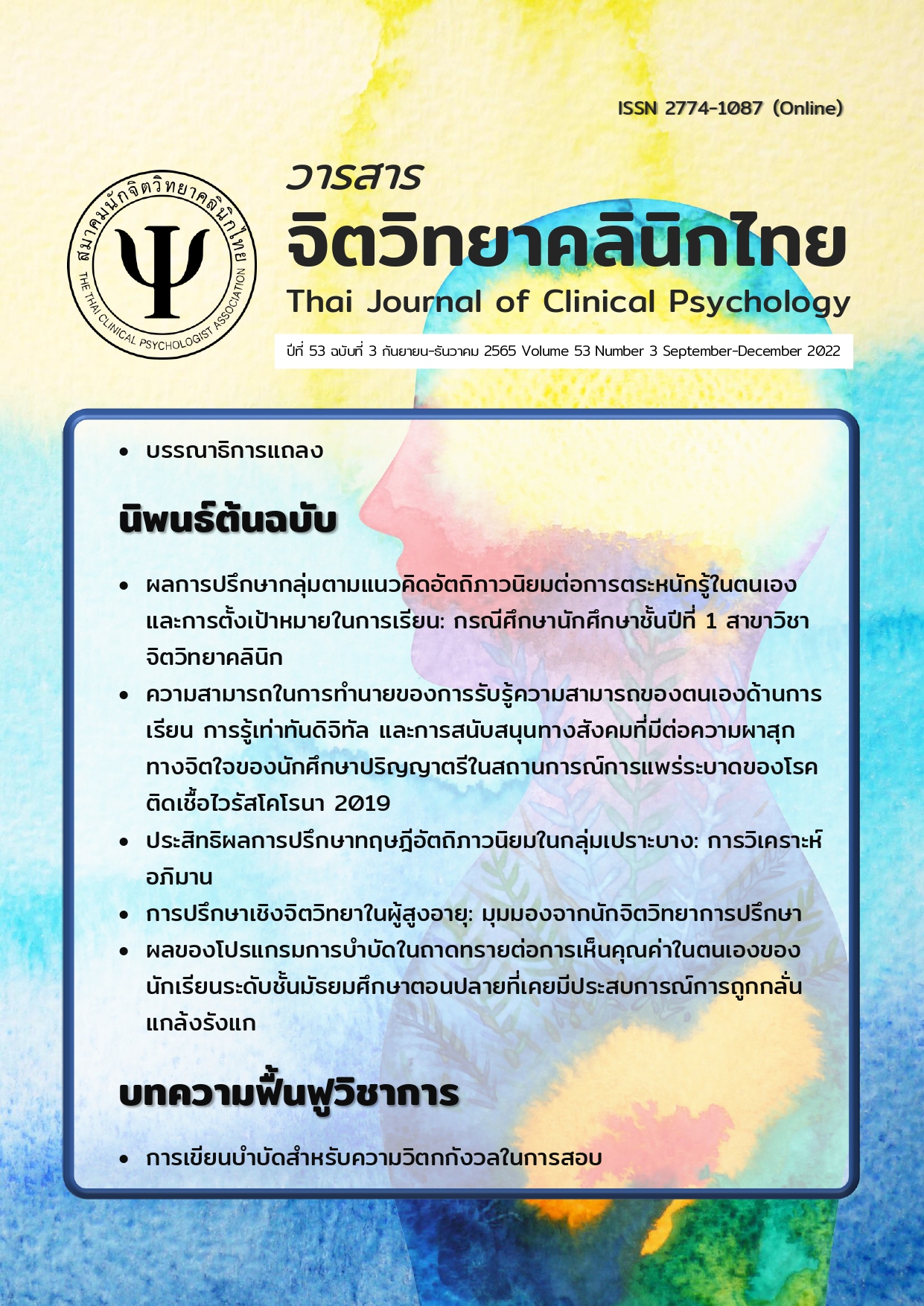ประสิทธิผลการปรึกษาทฤษฎีอัตถิภาวนิยมในกลุ่มเปราะบาง: การวิเคราะห์อภิมาน
Main Article Content
บทคัดย่อ
วัตถุประสงค์ เพื่อสังเคราะห์การใช้ทฤษฎีการปรึกษาอัตถิภาวนิยมในกลุ่มเปราะบางโดยศึกษาถึงคุณลักษณะงานวิจัยที่ส่งผลต่อประสิทธิผลการปรึกษาทฤษฎีอัตถิภาวนิยมและเปรียบเทียบประสิทธิผลการปรึกษาของแนวทางทฤษฎีการปรึกษาอัตถิภาวนิยมระหว่างแนวทางความหมายในชีวิตและแนวทางอัตถิภาวนิยม-มนุษยนิยมในกลุ่มเปราะบาง วัสดุและวิธีการ ทำการสังเคราะห์งานวิจัยที่เกี่ยวข้องกับการปรึกษาทฤษฎีอัตถิภาวนิยมในกลุ่มเปราะบางที่มีการเผยแพร่ผลงานระหว่างปี พ.ศ. 2543-2562 จำนวน 32 เล่ม ด้วยวิธีการวิเคราะห์อภิมานเพื่อหาค่าขนาดอิทธิพลต่อประสิทธิผลการปรึกษา โดยใช้แบบประเมินคุณภาพงานวิจัยและแบบบันทึกข้อมูลคุณลักษณะงานวิจัยที่สร้างขึ้นเองในการเก็บรวบรวมข้อมูลและทำการวิเคราะห์ข้อมูลด้วยโมเดลการวิเคราะห์อิทธิพลสุ่ม (random effect model) ผลการศึกษา คุณลักษณะงานวิจัย ประกอบด้วย ปัจจัยด้านกลุ่มตัวอย่าง (เพศ อายุ จำนวนตัวอย่าง) ปัจจัยด้านแนวทางทฤษฎีการปรึกษา (แนวทางความหมายในชีวิต แนวทางอัตถิภาวนิยม-มนุษยนิยม) ปัจจัยด้านตัวแปรทางจิตวิทยา (ด้านภาวะทางจิตใจ ด้านศักยภาพในตนเอง ด้านความหมายในชีวิต) ปัจจัยด้านประเภทการปรึกษา (การปรึกษารายบุคคล การปรึกษากลุ่ม) และปัจจัยด้านแผนการปรึกษา (จำนวนครั้งการปรึกษา ความถี่ของการปรึกษา ระยะเวลาการปรึกษาต่อครั้ง ระยะเวลาการปรึกษาทั้งหมด) ให้ขนาดอิทธิพลไม่แตกต่างกัน ยกเว้นเพศของกลุ่มตัวอย่างที่ให้ขนาดอิทธิพลแตกต่างอย่างมีนัยสำคัญทางสถิติที่ระดับ .05 และผลของแนวทางการปรึกษาที่ต่างกันให้ประสิทธิผลการปรึกษาไม่ต่างกัน สรุป การปรึกษาทฤษฎีอัตถิภาวนิยมในกลุ่มเปราะบางมีประสิทธิผลในตัวทฤษฎีเอง สามารถนำทฤษฎีไปประยุกต์ใช้ในบุคคลเปราะบางได้ทุกรูปแบบ โดยผู้ให้การปรึกษาจะเป็นส่วนสำคัญที่ทำให้การปรึกษาเกิดประสิทธิผล
Article Details

อนุญาตภายใต้เงื่อนไข Creative Commons Attribution-NonCommercial-NoDerivatives 4.0 International License.
เรื่องที่ลงตีพิมพ์ในวารสารจิตวิทยาคลินิกแล้วถือเป็นลิขสิทธิ์การเผยแพร่โดยวารสารจิตวิทยาคลินิกแต่เพียงผู้เดียว การตีพิมพ์หรือเผยแพร่ซ้ำในที่อื่นต้องได้รับอนุญาตจากกองบรรณาธิการวารสารฯ
เอกสารอ้างอิง
Ahn, H., & Wampold, B. E. (2001). Where oh where are the specific ingredients? A meta-analysis of component studies in counseling and psychotherapy. Journal of Counseling Psychology, 48(3), 251-257. https://doi.org/10.1037//0022-0167.48.3.251
Akeathikhomkit, N. (1999). A comparison of the effects of individual and group counseling based on existential therapy on sense of coherence of delinquency females in the training school for girl of Banpranee in Bangkok [Master’s thesis, Srinakharinwirot University]. Thai Digital Collection (TDC). https://tdc-thailis-or-th.eu1.proxy.openathens.net/tdc/dccheck.php?Int_code = 96&RecId = 14989&obj_id = 21627&showmenu = no (in Thai).
Alegria, S., Carvalho, I., Sousa, D., Correia, E. A., Fonseca, J., Pires, B. S., & Fernandes, S. (2016). Process and outcome research in existential psychotherapy. Existential Analysis, 27(1), 78-92. https://www.researchgate.net/publication/293633170_Process_and_Outcome_Research_in_Existential_Psychotherapy
Arunmala, W. (2015). Effects of existential group counseling on psychological well-being of the elderly [Master’s thesis, Burapha University]. BUU Library. http://digital_collect.lib.buu.ac.th/dcms/51927993.pdf (in Thai).
Baskin, T. W., Slaten, C. D., Crosby, N. R., Pufahl, T., Schneller, C. L., & Ladell, M. (2010). Efficacy of counseling and psychotherapy in schools: A meta-analytic review of treatment outcome studies. The Counseling Psychologist, 38(7), 878-903. https://doi.org/10.1177/0011000010369497
Borenstein, M. (2009). Effect sizes for continuous data. In H. Cooper., L. V. Hedges., & J. C. Valentine (Eds.), The handbook of research synthesis and meta-analysis (2nd ed., pp. 221-236). Russell Sage Foundation.
Cooper, M. (2008). Existential psychotherapy. In J. L. Lebow (Ed.), Twenty-first century psychotherapies contemporary approaches to theory and practice (pp. 237-276). John Wiley & Sons, Inc.
Corey, G. (2013). Theory and practice of counseling and psychotherapy (9th ed.). Brooks/Cole.
Correia, E. A., Cooper, M., Berdondini, L., & Correia, K. (2016). Existential psychotherapies: Similarities and differences among the main branches. Journal of Humanistic Psychology, 1-25. https://doi.org/10.1177/0022167816653223
Daengbhakdee, Y. (2006). The effects of existential therapy on reducing depression of suicidal risk [Master’s thesis, Burapha University]. BUU Library. https://webopac.lib.buu.ac.th/catalog/BibItem.aspx?BibID = b00216141 (in Thai).
Hillmann, M. (2004). Victor E. Frankl’s existential analysis and logotherapy. In W. Miles Cox., & E. Klinger (Eds.), Handbook of motivational counseling: Concepts approaches, and assessment (pp. 357-372). John Wiley & Sons, Ltd.
Intarachot, S. (2005). A comparison between technique of logogrouptherapy on the disabled’s sense of coherence [Master’s thesis, Burapha University]. BUU Library. https://webopac.lib.buu.ac.th/catalog/BibItem.aspx?BibID = b00215137 (in Thai).
Jongrak, D. (2013). Theories of counseling and psychotherapy (6th ed.). Technology Promotion Association (Thailand-Japan). (in Thai).
Julom, A. M., & Guzman, R. (2013). The effectiveness of logotherapy program in alleviating the sense of meaninglessness of paralyzed in-patients. International Journal of Psychology & Psychological Therapy, 13(3), 357-371. https://www.ijpsy.com/volumen13/num3/367/the-effectiveness-of-logotherapy-program-EN.pdf
Karki, P. (2018). An analysis of theories and practices in existential psychotherapy. Indian Journal of Clinical Psychology, 45(2), 69-71. https://www.researchgate.net/publication/337075772_An_Analysis_of_Theories_and_Practices_in_Existential_Psychoterapy
Khongkhao, N. (2016). The effects of existential group counseling toward self-awareness of secondary school students [Master’s thesis, Burapha University]. BUU Library. http://digital_collect.lib.buu.ac.th/dcms/files/54921001.pdf (in Thai).
Lybbert, R., Ryland, S., & Bean, R. (2019). Existential interventions for adolescent suicidality: Practical interventions to target the root causes of adolescent distress. Children and Youth Services Review, 100, 98-104. https://scholarsarchive.byu.edu/cgi/viewcontent.cgi?article = 5971&context = facpub
McRoberts, C., Burlingame, G. M., & Hoag, M. J. (1998). Comparative efficacy of individual and group psychotherapy: a meta-analytic perspective. Group Dynamics: Theory, Research, and Practice, 2(2), 101-117. https://www.egatin.com/static/McRoberts%20GP%201998-1618683896985.pdf
Moein, L., & Houshyar, F., (2015). The effect of logotherapy on improving self-esteem and Adjustment in physically disabled people. GESJ: Education Science and Psychology, 5(37), 3-13.
Moosavi, S., Kafi, S. M., Haghiri, M., Ofoghi, N., Atashkar, S. R., & Abolghasemi, S. (2012). Comparison of efficiency of cognitive therapy and logotherapy on the depression rate of aged men. International Journal of Psychology and Counselling, 4(11), 143-149. https://doi.org/10.5897/IJPC12.009
Noottaro, A. (2003). The effectiveness of nursing therapeutic using relaxation techniques in adult patients: A meta-analysis [Master’s thesis, Chulalongkorn University]. Chulalongkorn University Intellectual Repository (CUIR). http://cuir.car.chula.ac.th/Handle/123456789/5743 (in Thai).
Ounwong, T., Seehamongkon, Y., & Chingbumrung, B. (2012). The synthesis of research on teaching effectiveness of teachers: A meta-analysis. RMU.J (Humanities and Social Sciences), 6(2), 129-136. https://so05.tci-thaijo.org/index.php/rmuj/article/view/21588/18631 (in Thai).
Reawtaisong, P. (2014). The effects of logotherapy on meaning in life of the elderly with cancer [Master’s thesis, Burapha University]. BUU Library. http://digital_collect.lib.buu.ac.th/dcms/files/52921180.pdf (in Thai).
Songpanit, B. (2001). The effect of logotherapy on meaningfulness in life of the refugees [Master’s thesis, Chulalongkorn University]. Thai Digital Collection (TDC). https://tdc-thailis-or-th.eu1.proxy.openathens.net/tdc/browse.php?option = show&browse_type = title&titleid = 549815 (in Thai).
Srikosak, P. (2003). A comparison of the effects of existential individual and group counseling on society-reentry anxiety of drug addicts at Thanyarak institute [Master’s thesis, Srinakharinwirot University]. Thai Digital Collection (TDC). https://tdc-thailis-or-th.eu1.proxy.openathens.net/tdc/dccheck.php?Int_code = 96&RecId = 269&obj_id = 27473&showmenu = no (in Thai).
Sukhothai Thammathirat University. (2008). Theory and practice in counseling unit 1-8 (3rd ed.). Sukhothai Thammathirat University. (in Thai).
Tuicomepee, A. (2011). Logotherapy (2nd ed.). Chulalongkorn University. (in Thai).
Vos, J., Craig M., & Cooper, M. (2015). Existential therapies: A meta-analysis of their effects on psychological outcomes. Journal of Consulting and Clinical Psychology, 83(1),115-128. http://dx.doi.org/10.1037/a0037167
Weisz, J. R., Weiss, B., Alicke, M. D., & Klotz, M. L. (1987). Effectiveness of psychotherapy with children and adolescents: A meta-analysis for clinicians. Journal of Consulting and Clinical Psychology, 55(4), 542-549. https://doi.org/0022-006X/87/500.75
Wiratchai, N. (1999). Meta-analysis. Chulalongkorn University. (in Thai).


